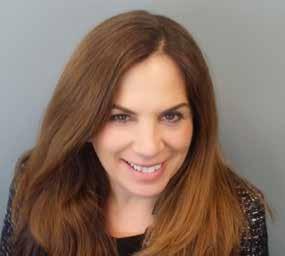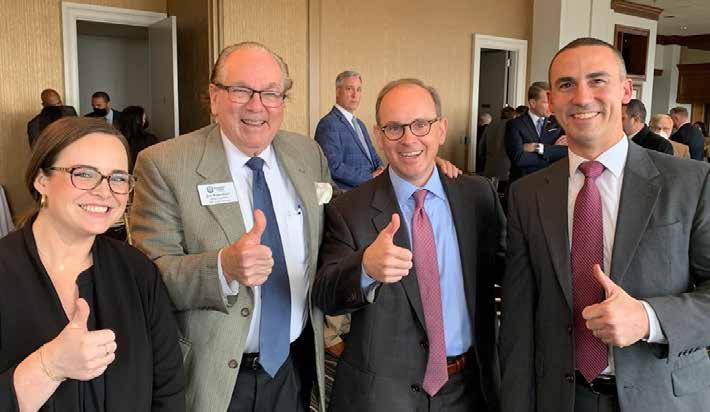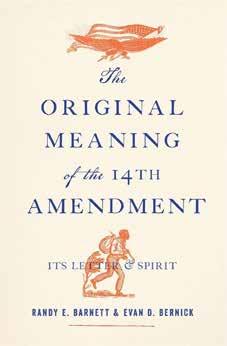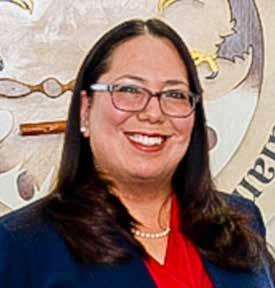Judicial Profile
Hon. Allie Greenleaf Maldonado
Chief Judge, Little Traverse Bay Bands of Odawa Indians by N. Lauryn Boston
T
N. Lauryn Boston is a licensed attorney in Washington State and is privileged to work in Indian law. She earned her J.D. from the University of Colorado at Boulder, where she was active in the Native American Law Students Association and president of the American Constitution Society law student chapter. She holds a certificate in mediation from Harvard Law School. She can be reached at lauryn. boston@muckleshoot.nsn. us. © 2022 N. Lauryn Boston. All rights reserved.
he reservation lands of the Little Traverse Bay Bands of Odawa Indians (“LTBB Tribe”) lie along the picturesque northern shores of Michigan’s Lower Peninsula, where great white pine, red oak, and colorful sugar maple dominate the landscape of a region once called by the native Odawa “the land of the crooked tree.”1 It is here that the Hon. Allie Greenleaf Maldonado presides as chief judge of the LTBB tribal court, a position she’s held since 2012, after spending nine years as assistant general counsel for the LTBB Tribe. Judge Maldonado is both a citizen of the LTBB Tribe and a transplant to the great state of Michigan. She is simultaneously a Native American with roots deep in her ancestral homeland and a newcomer to the LTBB reservation and tribal community. The path that led her home to a place she’d never been before was motivated, in part, by a need to understand and reconcile a painful and buried family history that took place on the reservation between and 1889 and 1983.2 What she learned about her own family inspired her to pursue a career in law and ultimately a place on the bench in Indian Country. Set amid the burgeoning suburban enclave of Harbor Springs, Mich., and surrounded by art galleries, golf courses, and scenic shoreline walking trails, the reservation belonging to the LTBB Tribe occupies a small corner of the Eastern Woodlands territory that once belonged to the Odawa nation, a vast region of land stretching from Ontario, Canada, to the northeastern United States. Today, the LTBB Tribe consists of approximately 5,000 enrolled members who endeavor to maintain their cultural heritage while administering a modern tribal government, deftly combining traditional native practices with cutting-edge science and technology to address a range of issues, from forest management and climate change mitigation to food sovereignty and restorative justice.3 This type of innovation has helped the LTBB Tribe create promising opportunities for its citizens, even as it grapples with the long-term negative effects of historic trauma created by U.S. policies toward Native Americans that cost Indian families their land, their sovereignty, and even their children.
16 • THE FEDERAL LAWYER • March/April 2022
The practice of removing Indian children from their parents and placing them for adoption or at Indian boarding schools was an official U.S. policy that ripped thousands of Native American children across the country from their families and communities. Ostensibly intended as a way to lift Indian children from poverty, it was in fact a form of cultural genocide that resulted in the destruction of entire family units, the effects of which still resonate today in the lives of thousands of tribal descendants and survivors of this practice.4 Located in Harbor Springs, Holy Childhood was one of the last Indian boarding schools to operate in Michigan. Opened as a mission school in 1889, it did not cease operation until 1983.5 Many Odawa tribal families were forever affected by its legacy. Despite these challenges, the LTBB Tribe continues to persevere. It could be said that through hard work and a focus on education and training, the LTBB Tribe has succeeded in creating an environment where its citizens and children can thrive, achieve their potential, and give back to their community— and in this sense, the LTBB Tribe and Allie Greenleaf Maldonado have much in common. After earning a bachelor’s degree in business from the City University of New York in 1995, Judge Maldonado graduated in the top third of her class from










